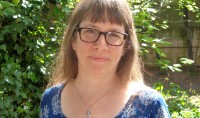Welcomed to ministry
Almost 25 years ago, I began learning to be a minister under the patient guidance of Bernard O. Brown, the dean of the chapel at the University of Chicago and an Episcopal priest. Our Sunday service ended with a Eucharist, celebrated at a large and imposing altar that stretched across the center of the chancel. I learned to make my gestures big, to open my arms wide, to lift the cup above my head.
What I never quite got the hang of was the chanting. There was a small part of the service that the celebrant always sang. Bernie has a beautiful voice. In his student days, he had sung with the Lyric Opera of Chicago. To hear his voice ring out over the altar was like hearing stained glass turned into music: full of color, right on pitch, reverent in tone.
Read our latest issue or browse back issues.
To hear me chant was another experience. I would heave my voice over that altar as best I could, hoping I would land on a note—not too high, not too low—that would make it possible for the congregation to sing back its response. Some mornings I could hear all of my insecurities about my authority as a minister amplified in those few lines of chant.
One Sunday when Bernie was out of town, Peter Gomes of Harvard's Memorial Church came to fill the pulpit. I'm sorry to say that I don't remember the text on which he preached or the words of his sermon. What I do remember is his voice, which rang out through our church, full of humor and wisdom and authority. He sounded like a person who knew who he was. And who he was—was a minister.
Peter and I returned to Bernie's office to take off our robes and collect our things. As he prepared to leave, Peter extended his hand. "It was such a pleasure working with you this morning," he said. "It's always good to hear a woman's voice in the liturgy. The chanting was especially nice."
Peter Gomes died on February 28 at the age of 68. I hadn't thought about our first meeting for years, and I don't think, to my great regret, that I ever reminded Peter of it. I don't think I ever told him how much it meant to me to be greeted by him as a colleague in ministry in the days when I was so unsure of myself.
The hand he extended to me on that Sunday morning remained extended. He was a powerful ally in supporting ministry preparation at Harvard and a dedicated teacher, both rigorous and generous, of future ministers. Each year he made a place for students in the leadership of Memorial Church and gave them room to learn to become the ministers that God was calling them to be. Students who took his preaching class learned to preach without a manuscript, received Peter's razor-sharp theological critique of their words and their delivery and had the great good fortune to share meals at Peter's table. Peter had felt welcomed into the ministry by his teachers at Harvard Divinity School and challenged to meet the very highest standards. He passed along both the welcome and the challenge to the students he mentored and taught and advised.
The great African theologian Augustine of Hippo spent a lot of time pondering the mysteries of memory—the way some memories stick and others don't, the way some disappear and then return, the way others are lost irrevocably. He felt frustrated that some memories remained forever inaccessible to him, lost in the "vast and boundless subterranean shrine" that he imagined memory to be. "I dive down deep as I can," he wrote in his Confessions, "and I can find no end, nor can I myself grasp all that I am." Only in you, he says to God, can I recover the memories that I have lost.
We cannot know ourselves fully, Augustine says, because we cannot remember every moment of our lives; no one can. Only God remembers everything that has happened to us, all that we have thought and felt and done. If we are to know ourselves, Augustine insists, we have to search for ourselves in God.
Surely this is also true of the beloved friends we have lost. Like our lost memories and theirs, they are held now in God. I still expect to see Peter walking to class with a book tucked under his arm and students buzzing around him or sitting with his head bowed in Appleton Chapel before morning prayers or standing in the pulpit that I will always think of as his. Like so many others, I miss him. I'll remember him now in the places where he sought to know himself—in God and in the worship of God, in the hymns and psalms he knew by heart, in the scripture he spent a lifetime opening, in the liturgies in which he treasured every kind of voice.








